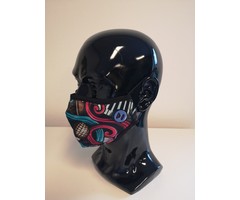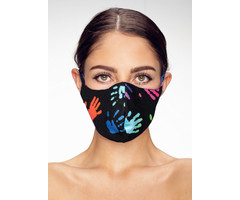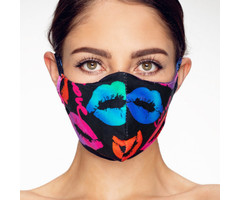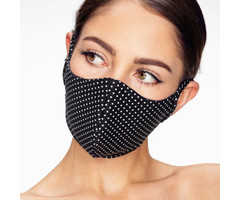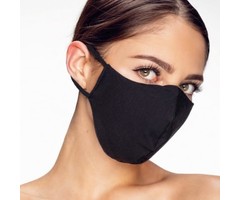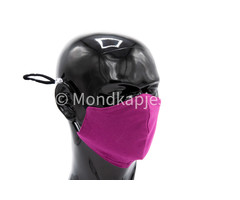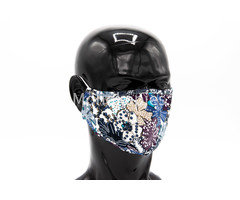Cotton Face Masks - Wholesale Supplier of Reusable Face Masks
Cotton Face Masks
One of the most critical precautions you can take to avoid the spread of coronavirus, also known as COVID-19, is to wear a face mask. Are there any other critical actions to take? Handwashing, social separation of at least 6 feet, not touching your face, and cleaning and sanitizing your surroundings are all recommended by public health professionals. You can keep not just yourself and your family healthy, but also your entire community, by following all of these safety precautions.
But just because you understand the need for masking doesn't imply you know how to execute it. Here, infectious disease experts discuss the best materials for reusable face masks, how to wear them appropriately, and when and how to clean them properly.
Cotton face masks can reduce the spread of respiratory infections like COVID-19 by trapping airborne droplets emitted during sneezing, coughing, or even talking, especially in cramped environments with poor ventilation. (Wearing a mask can also protect you from the typical cold or flu, which according to 2018 research can be spread through the air.) Additionally, wearing a mask may reduce the severity of your illness if you do get the coronavirus. When you're around people you don't live with, you should put on a mask.
What is Cotton Face Mask?
When a person talks, coughs, or sneezes, respiratory droplets are emitted. A cotton face mask is designed to collect these droplets. It also works as a shield to keep the user safe from inhaling droplets from others.
Cloth masks composed of numerous layers of tightly-woven fabric, such as cotton, are the most effective. More droplets will not be able to get through or escape from a mask with layers.
Cotton face masks are the greatest solution for halting the spread of COVID-19, according to the medical community. Cotton, unlike most other textiles, filters out a higher percentage of particles. Cotton fibers are also soft, cool, and breathable, making them more comfortable to wear.
How to Get the Most from your Cotton Face Mask?
Cotton face masks can be made more effective by making sure they are well suited to your face's contours to minimize air leaking around the mask's edges.
No gaps should exist between the mask and the nose, mouth, or chin. When you breathe out, you should feel warm air coming through the front of the mask. You shouldn't be able to feel air coming out of the mask's edges.
The way you use, store, and clean your mask has an impact on how well it protects you. To put on and remove your mask, follow these steps:
- Before and after putting on your mask, wash or sterilize your hands.
- Cover your lips, nose, and chin with your mask.
- Use ear loops or tie them behind your head. Make sure it's not too tight.
- While wearing your mask, avoid touching it.
- If you touch your mask by accident, wash or sterilize your hands.
- Replace your mask with a clean one if it becomes damp or filthy. Place the used mask in a sealable bag until it can be disposed of or washed.
- Untie the mask or lift the ear loops to remove it without contacting the front of the mask or your face.
- After removing your mask, wash your hands immediately.
- Washcloth masks in the washing machine or by hand regularly. (They can be washed in the same machine as ordinary laundry)
How effective are Cotton Face Masks?
139 countries mandated the wearing of facial coverings in public spaces such as supermarkets and public transportation at the height of the COVID-19 outbreak. The World Health Organization also recommends the usage of face coverings and provides information on their benefits. Face coverings prevent COVID-19 from spreading through exhaling and protect the wearer during inhaling.
The researchers describe how they reviewed and modeled filtration mechanisms, including inertial impaction, to look at how liquid droplets are caught and filtered out of fabric masks in a report published in a scientific publication.
Inertial impaction works differently than a sieve or colander in that it forces the air in your breath to twist and swirl inside the mask to the point where the droplets can't follow the direction of the air. Instead, the droplets collide with the mask's fibers, preventing inhalation.
The researchers discovered that, under ideal conditions and depending on the fit, three-layered fabric masks can filter droplets comparable to surgical masks, reducing exposure by 50 to 75 percent in both cases. For example, if an infected person and a healthy person both wear masks, scientists predict that exposure will be reduced by up to 94%.
How to Choose the Right Cloth Face Mask?
According to the CDC, you should choose a mask made of breathable fabric—that is, one made of cloth rather than leather or plastic, which does not filter the air effectively. Denim, for example, is a dense fabric that allows airflow but is not very breathable.
Most breathable materials, as long as they have a high thread count, are effective. Any tightly woven fabric would suffice; the CDC recommends cotton, but research has also shown that silk and polypropylene can effectively repel respiratory droplets. Athletic fabrics like spandex have also been shown to be effective at preventing respiratory droplets, but only when worn in layers.
A lightweight face mask is chosen based on a few key factors. Here's what you should do if you're looking for a new cover.
- Think about when you'll put it on. Consider what you intend to do while wearing your mask. Exercising and working in a retail job, for example, may necessitate two distinct approaches. Throughout the duration of your stay, your covering should keep you dry and comfortable. While cotton is a good choice in general, it "can be thick, making it difficult to breathe in while exercising or in hot weather," according to Nate Favini, M.D., M.S., medical lead at healthcare startup Forward. For exercise or particularly hot weather, he recommends moisture-wicking fabrics, such as those used in activewear, because they dry quickly when exposed to liquids like sweat. Most masks should be replaced as soon as possible, according to the CDC.
- Make the light test. “You can find masks of every imaginable fabric in this new COVID-19 reality,” says Iahn Gonsenhauser, M.D., M.B.A., chief quality and patient safety officer at Ohio State University Wexner Medical Center. A simple light test can help you distinguish between the safe and the ineffective. “If daylight can be seen between fibers, the weave is too loose, and multiple layers are required.” Masks with filters or vents, according to the CDC, can allow respiratory droplets to leave and enter your mask.
- Make sure it's the right size. Fit is critical because it allows your mask to function properly. Dr. Gonsenhauser says that any mask that covers your mouth and nose fits comfortably so you don't have to touch it often, and is made of a multi-layered or tightly woven material will suffice. Consider the straps as well; around-the-ear straps are ideal for athletes who will be slipping their masks on and off frequently, whereas tie-back straps are ideal for shift workers who will be wearing their masks for long periods of time.
- Finally, any breathable face mask that complies with CDC guidelines will help protect you and others from COVID-19, especially as the weather warms up and we return to the outdoors. The face masks listed below are the best of the best in terms of lightness and effectiveness.
- Finally, any breathable face mask that complies with CDC guidelines will help protect you and others from COVID-19, especially as the weather warms up and we return to the outdoors. The face masks listed below are the best of the best in terms of lightness and effectiveness.
Why Use a Cloth Face Mask?
The increased use of disposable personal protective equipment is an undesirable side effect of the Coronavirus epidemic (PPE). Throwaway masks may make you feel uneasy as a conscious consumer, especially in the long run—though in some cases, such as medical settings, disposable masks are the only safe alternative. But for the rest of us, there's no excuse not to invest in these ethical firms that make reusable and sustainable face masks to keep safe while also looking amazing.
Masks were marketed as a means to shield people from your droplets and slow the spread of disease when most countries were just opening up.
Disposable masks are important in hospital settings or where minute, airborne particles are a concern, yet they are single-use and wasteful.
The CDC recommends fabric face masks for the general public since these masks are required for healthcare workers.
Cloth face masks are reusable face masks made out of various fabrics. While they don't protect against the tiniest airborne particles, they do an excellent job of guarding against the respiratory droplets that carry the virus if designed and worn appropriately.
The important term for material is "tightly woven." The larger the gaps between threads, the more particles are likely to pass through.
Tightly woven fabric will also provide you with a high-quality product that will last many washes.
Cotton appears to be the material of choice, with one study finding that garments made entirely of cotton had the best filtration efficacy.
The important term for material is "tightly woven." The larger the gaps between threads, the more particles are likely to pass through.
Tightly woven fabric will also provide you with a high-quality product that will last many washes.
Cotton Face Masks is the Right Choice
Cotton appears to be the material of choice, with one study finding that garments made entirely of cotton had the best filtration efficacy.
Cloth face masks with many layers of fabric that fit snugly on the face while allowing for clear breathing are recommended by the CDC. After being washed and dried, the masks should be resistant to being damaged or changing shape. Cloth masks that comply with these guidelines are thus considered safe.
These cloth masks will have a lower carbon footprint if they are made from organically grown cotton (or another efficient fabric) that is also locally sourced and if they are produced locally, which is good news for the environment. When you buy from a small, certified, entrepreneurial firm – such as refugees or unemployed people - you are also assisting them in surviving these difficult economic times. It's also a socially responsible decision.
The CDC recommended placing a cloth face covering over a surgical mask in February, and celebrities were among the first to do so to help stop the spread of COVID-19. Following an increase in coronavirus incidence and hospitalizations, cities such as Los Angeles and St. Louis have lately reverted to indoor mask laws. These infections include "breakthrough" cases, which have lesser symptoms in those who have been vaccinated.
The best reusable masks can have a long lifespan with regular care and washing, as well as protect against airborne virus particles. No more digging through your bag for a blue disposable mask, or searching online only to discover that your favorite masks are once again sold out.
The best effective fabric masks, according to the CDC, include materials that match these guidelines:
- Fabrics with a tight weave, such as cotton and cotton blends
- Breathable
- Two or three layers of cloth
However, always check the label of your mask, since some manufacturers utilize specific fabric blends, particularly to promote warmth during the winter or wick moisture.
The mask's seal is one of the most critical considerations. Your mask should be snugly fitted over your nose and mouth, with no holes that could allow virus particles to enter. Look for a reusable face mask with adjustable ear straps or a mask with a tight cone shape that fits the shape of your nasal bridge.
Buy cotton face masks at Nobraa.com
At Nobraa you can find great cotton face masks, whether it is a plain black mask or one with bright colors. You can wear our protective and high-quality masks for a long time. The flexible fabric allows you to breathe relatively freely, and you are less likely to be bothered by it. We also have disposable face masks, if you are interested in those. For those who need a mask during fitness, running, mountain biking, or any other form of sport, we recommend you take a look at our sports masks and training masks.
We provide a wide range of face cover masks, including knit face masks, cotton face masks, textiles face masks, dust face masks, and other respirators. There are a variety of textiles to pick from, including colors and cloth textures. Contact us today to know more.



